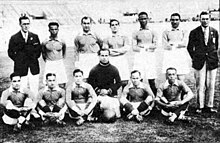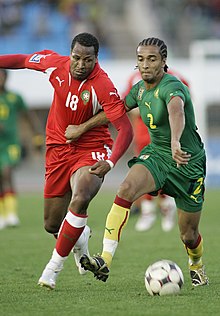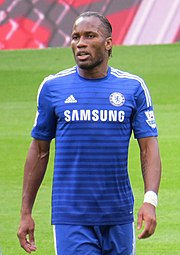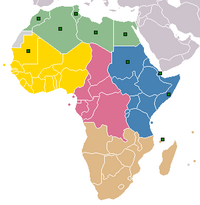Portal:Football in Africa
Introduction
Football is the most popular sport in Africa, alongside Basketball. Indeed, football is probably the most popular sport in every African country, although rugby and cricket are also very popular in South Africa. The first football stadium to be built in Africa was the Alexandria Stadium in 1929. (Full article...)
This section may be unbalanced toward certain viewpoints. (October 2022) |

Selected article -
On 2 June 1957, Tunisia played their first match against Libya and they won 4–2. Periods of regular Tunisian representation at the highest international level, from 1962 to 1978, from 1994 to 2008 and again from 2014 onwards. The team qualified for the FIFA World Cup for the first time in 1978, becoming the first African and Arab team to win a world cup match by beating Mexico 3–1 in the first match, they have since qualified six times, never making it past the group stage. The team qualified for the Africa Cup of Nations for the first time in 1962 and won the title in 2004, when they hosted the event after beating Morocco in the final. Tunisia qualify once for the FIFA Confederations Cup in the 2005 and was eliminated from the group stage. The team won the African Nations Championship in 2011 by beating Angola in the final and the FIFA Arab Cup in 1963, won both from the first participation.
Radhi Jaïdi, with 105 international matches, holds the record for the number of matches played by the Tunisian national team while Issam Jemâa, with 36 goals, is the top scorer in the history of the selection. The highest rank reached by the team in the FIFA Men's World Ranking is 14th in April–May 2018 and the lowest is 65th place in July 2010. On 17 November 2020, after qualifying for the 2021 Africa Cup of Nations, Tunisia became the most present African team in the history of the competition with sixteen consecutive participations, they never missed since the 1994 edition, breaking the record of Egypt and its fourteen consecutive participations.
Selected biography -
After playing in youth teams, Drogba made his professional debut aged 18 for Ligue 2 club Le Mans. A late bloomer, he signed his first professional contract aged 21; it was not until the 2002–03 season that he realised his potential, scoring 17 goals in 34 appearances in Ligue 1 for Guingamp. He moved to Olympique de Marseille in 2003 for £3.3 million. His scoring success at Marseille continued, finishing as the third highest scorer in Ligue 1 with 19 goals and helped the club to reach the 2004 UEFA Cup Final.
In the summer of 2004, Drogba moved to Chelsea for a club record £24 million fee, making him the most expensive Ivorian player in history. In his debut season he helped the club win their first league title in 50 years, and a year later he won another Premier League title. He went on to win three Premier League titles (clinching the Golden Boot twice in the process), four FA Cups and one League Cup. In March 2012, Drogba became the first African player to score 100 Premier League goals, and made his last appearance for Chelsea in the 2012 UEFA Champions League Final, in which he scored an 88th-minute equaliser and the winning penalty in the deciding shoot-out against Bayern Munich.
Selected image -
 |
Fans of the Angola national team cheer on their side during their quarter-final clash against Egypt at the 2008 Africa Cup of Nations. The Angola national team is controlled by the Angolan Football Federation, and qualified for a World Cup finals for the first time in 2006, where they were eliminated after one defeat and two draws in the group stage.
Subcategories
Related portals
More sports portals
WikiProjects
Related task forces and sub-projects
African football task force
WikiProject Africa • WikiProject Football
WikiProject Football task forces and sub-projects
 | |
| Wikipedia ads | file info – #250 |
Topics
Open tasks

- Expand stubs: Competitions in Africa • Organizations
- Expand club articles of teams from Africa.
- Expand biographies of Africans involved in football.
- Create: Requested articles • Most wanted football articles • Requested general football articles
- Add: Infoboxes • Images (General requests, Requested images of people)
- Review: articles currently under review
- Assess: Assessment requests • Assess an article
- Revert vandalism on this portal and on African football articles
- Assist in maintaining this portal and keeping its selected content up to date.
- WikiNews: Create and submit news stories about African football for Wikipedia's sister project WikiNews.
Associated Wikimedia
The following Wikimedia Foundation sister projects provide more on this subject:
-
Commons
Free media repository -
Wikibooks
Free textbooks and manuals -
Wikidata
Free knowledge base -
Wikinews
Free-content news -
Wikiquote
Collection of quotations -
Wikisource
Free-content library -
Wikiversity
Free learning tools -
Wiktionary
Dictionary and thesaurus
More portals
Sources

- ^ "The History Of Soccer In Africa". NPR.org. 2010-06-09. Retrieved 2016-03-31.
- ^ a b c Alegi, Peter (2010). African Soccerscapes. Ohio University Press. pp. 1–2. ISBN 9780896802780.
- ^ Frimpong, Enoch Darfah. "Ghana news: A world of superstition, frustration and disillusionment - Graphic Online". Retrieved 23 September 2017.
- ^ Lacey, Marc (8 August 2002). "Kangemi Journal; For Spellbinding Soccer, the Juju Man's on the Ball". The New York Times. NY Times. Retrieved 2016-03-31.
- ^ "World Cup Witchcraft: Africa Teams Turn to Magic for Aid". National Geographic. Archived from the original on July 10, 2006. Retrieved 2016-03-31.
- ^ Andy Mitten (September 2010). The Rough Guide to Cult Football. Rough Guides UK. ISBN 9781405387965. Retrieved 2016-04-02.
- ^ "African Nations Cup overshadowed by hocus pocus | Football". The Guardian. Retrieved 2016-04-09.
- ^ Kuper, Simon (2006). Soccer Against the Enemy: How the World's Most Popular Sport Starts and Stops Wars, Fuels Revolutions, and Keeps Dictators in Power. Nation Books. p. 123. ISBN 978-1-56025-878-0.


























